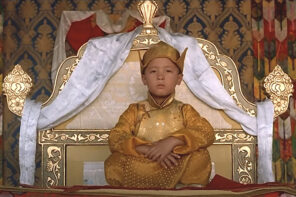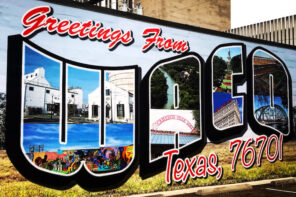Cartwheels in a Sari: A Memoir of Growing Up Cult
By Jayanti Tamm
(Harmony Books, 2009)
So what’s the difference between a guru and a cult leader? Lots. A guru is a simply a teacher, anyone who helps an aspirant remove the veil of ignorance. But when Indian teachers first came to the West and asked their students to trust them, to revere them—and even to serve them—the ground was prepared for a cultural confusion that is still being untangled.
Jayanti Tamm, author of Cartwheels in a Sari, grew up in the inner circle of Sri Chinmoy, a popular Bengali teacher who came to New York City in the ’60s and developed a strong following. Her parents conceived her in violation of the community’s celibacy rules, but the guru, rather than rejecting her, dubbed her “Chosen One” and she became a cherished favorite.
Chinmoy, an orphan, had himself grown up in a religious community, the ashram of Sri Aurobindo. The religious life he required of his followers (including practicing abstinence from sex, vegetarianism, and poverty) was conventional enough as far as monastic rules went, not a sign of cultishness; and many of Chinmoy’s devotees never experienced the group this way.
But the role of guru carries risks; for the soul of the teacher as much as for the student. It is apparently all too easy to succumb to a particularly virulent form of narcissistic disorder when people are throwing rose petals at you all day. And when a teacher loses his bearings, the signs are hard to miss.
As Tamm grew up and witnessed the guru’s increasingly erratic posturing (elaborate weightlifting hoaxes and an underground zoo of exotic animals were among his most bewildering experiments), she began to question the idea of devotion to a guru. After a number of attempts to leave, she broke free of the group at age twenty-five.
I recently caught up with Tamm to talk about Sri Chinmoy’s death, her use of the word “cult,” and what her spiritual life looks like today.
**
Did it make a difference to his followers that Sri Chinmoy was from India? Did it give him extra authority?
In the late 1960s, there was a trend to look to the East for alternatives to Western religions and philosophies. Many people felt that the ancient traditions of the East might hold the answers to their modern longings. As a result, there were many gurus, yogis, and spiritual teachers that headed to America eager to establish themselves and build a large following. Since Sri Chinmoy had been raised in an Indian ashram, he believed he had the proper credentials to become a guru.
How did Sri Chinmoy court fame? How did he make his publicity stunts and celebrity meetings seem necessary and legitimate among his core followers?
Establishing his base in the midst of New York City, Sri Chinmoy always was driven with the ambition to become a world leader. In the early 1970s, one of his disciples who worked at the United Nations started a meditation club named after the guru. With that credential, Sri Chinmoy promoted himself around the world as the official spiritual leader and “Peace Ambassador” of the United Nations. Shortly after that, Sri Chinmoy instructed his disciples to launch a campaign to lobby for him to receive the Nobel Prize. From having his disciples around the world praying every morning for him to win the award, to convincing other world leaders to lobby on his behalf, Sri Chinmoy was intent on being more famous than the Dalai Lama and the Pope.
Sri Chinmoy’s disciples believed his claim that he was the last and highest living avatar on Earth; he was the direct representative of God. Having the opportunity to spread his message felt like an honor for his disciples, and they believed that having the Guru reach the broadest audience possible was a way to spread God’s light around the world. Throughout the years, Sri Chinmoy devised new methods to gain public attention—from weightlifting elephants and helicopters on specially-rigged contraptions, to convincing national monuments like the Statue of Liberty and Niagara Falls to be renamed in honor of the guru—his disciples felt that they were benefiting humanity by making the guru famous.
How do you think people generally differentiate between religion and cult, and how do you feel your personal definition compares and contrasts with public perception of the two?
I believe that the common assumption is that religions are older, established organizations that have been assimilated into mainstream society. Cults, on the other hand, are commonly viewed as newer, informal organizations that are separate from mainstream society. My personal definition of a cult focuses on a number of key characteristics that cults share. The first is that a cult is centered around a single individual or a small group of leaders that possess total and complete authority over the members. The members cannot question, doubt, or criticize the leader. If someone does question the leader’s authority, that person is singled out and punished. Perhaps what is the most important common trait is that in order to preserve unity and to keep total authority, there is a clear separation between those inside the group and those outside the group. Finally, if someone does leave the group, that person is punished by being banished, excommunicated, stripped of economic support, and is sometimes put in physical danger.
Do you worry that your labeling of Sri Chinmoy’s group will hurt his most vulnerable followers?
I understand that ‘cult’ is a loaded term. When I was a disciple, I remember that we referred to other groups and sects as ‘cults,’ but we proudly called ours a ‘spiritual path.’ The irony is, of course, that according to so much research conducted by psychologists, psychiatrists, and sociologists, we fit perfectly into the traditional definitions of a cult. Using the word ‘cult,’ in my book, will perhaps lead to an honest conversation about the true nature of the Sri Chinmoy Center.
Your parents remained with Sri Chinmoy’s group for seven years after you left, and it isn’t clear in the book what happened to your brother. How did your parents’ allegiance to Sri Chinmoy affect your relationship with them, and where is your family now?
I was very fortunate because when I was banished from the cult, my parents defied Sri Chinmoy’s orders to evict me and disown me. Because of their disobedience, they received threats and harassment from other disciples, and that eventually led to their own ties with the group loosening, and being permanently severed in 2002. If I didn’t have their emotional and financial support when I left, I honestly don’t know what would have happened to me. I’m so grateful that they helped me when I most needed it. They are no longer together. The ‘divine marriage’ that Sri Chinmoy created on the first night that they met each other and the guru back in 1968 ended.
My brother, on the other hand, is still a very devout member of the cult. He wrote me a letter saying that he could not support my decision and that he didn’t want to have anything to do with me. He still lives right in the hub of the ashram. I also have an aunt, my father’s sister, who is a devoted member as well, who also has had no contact with me or my parents for years.
For legal or ethical reasons, did you wait until he had passed to publish your memoir?
Sri Chinmoy died on October 11, 2007. I had sold my book to Random House in October 2006, so I was still in the process of writing the book when he passed away. Right from the start, the memoir had been scheduled to be released in April 2009.
Some current disciples seem to have organized efforts to discredit your story. How have you handled their reactions?
I understand their reaction because I used to feel like them. Anyone whom we believed was out to present a view of the guru that posited him as anything other than as a perfect being and living saint—we were outraged. Because I know their perspective, I am not surprised by it. I would be so interested to hear their true reaction to Cartwheels in a Sari because if they read it, they would see that the book explores the complicated realities that encompassed Sri Chinmoy and his mission.
What is your spiritual life like today?
I officially do not have a ‘spiritual life.’ In fact, even the word ‘spiritual’ is one that I cannot separate from my life with Sri Chinmoy. I am happily living a secular life. I don’t have any desire to follow a religion or dogma. I find happiness, peace, and love in the mundane details of life: laughing with my baby daughter, attending a new play, or dancing to my favorite music.




